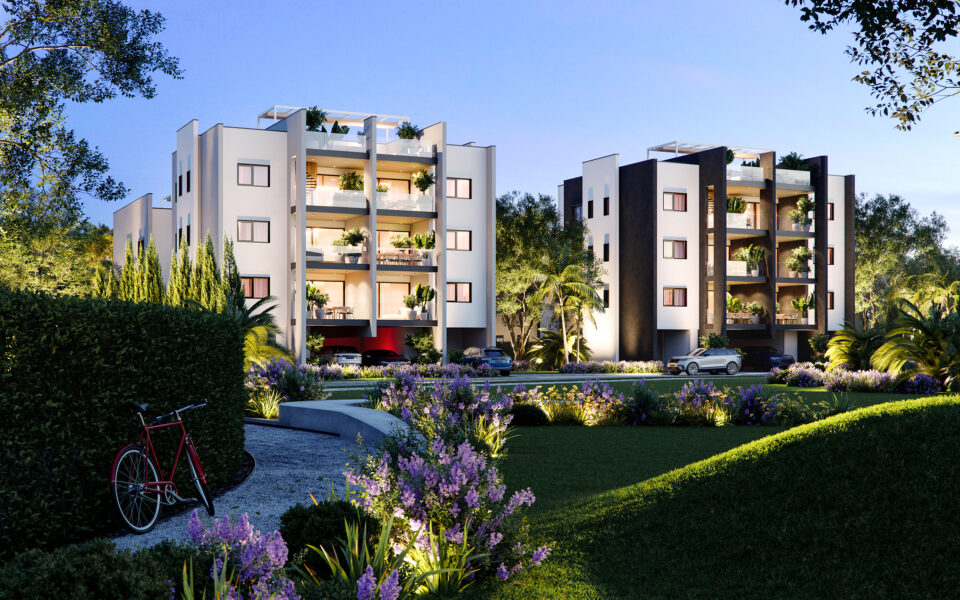At a time when the planet is sounding the alarm, it becomes more necessary than ever for universal action to protect the environment. Unprecedented changes in the global climate system, higher temperatures, global warming as well as the increasing frequency and intensity of extreme weather conditions prove that climate change is much closer than we imagined. International organisations and governments have stressed the need for immediate and effective action.
The design of real-estate
The real estate sector, which is responsible for 40 per cent of global greenhouse gas emissions, is called upon to play a key role in trying to reverse the course of events. Real estate can contribute by creating buildings that will have the least possible impact on the environment during the construction phase and will be supplied with green energy. Modern design can contribute substantially, as it provides the ability to reduce the needs of buildings for lighting, heating and cooling, while in combination with the use of alternative energy sources, real estate can achieve a net-zero energy balance. At the same time, tree planting and green roofs can improve the biodiversity of local habitats and mitigate the effects of extreme weather conditions, while enhancing the quality of life of residents.
Still long way to go
In recent years, significant steps have been taken in the Cyprus real-estate market. Progress is mainly in the areas of energy efficiency of buildings and the installation of modern heating, ventilation and air conditioning equipment as well as through the use of efficient lighting (LED). Equally important is the extensive use of photovoltaic systems as well as the energy upgrade of a large number of existing buildings.
Nevertheless, the distance that must be covered until the transformation into a market of high environmental responsibility is still very long. Companies that do not directly incorporate the concept of sustainability into their philosophy and their new projects will be exposed to serious risks in the near future.
Millennials choose sustainability
As governments continue to set stricter standards, it is very likely that real-estate developers will be forced, either at the construction stage or later, to carry out high-cost interventions for their developments to meet minimum required standards. Millennials, the most important regulators of market demand these days, are characterised by high environmental sensitivity and put sustainability, energy efficiency and quality of life at the forefront of their purchasing decisions. At the same time, the demand for green business spaces is increasing. The fact that more and more millennials are looking to work for companies that implement social and environmental responsibility policies should be taken seriously into account.
Another risk that companies which do not adopt green policies will face is the possibility of not being able to secure financing or higher bank lending. The ECB is already increasing its demands against financial institutions for proper climate risk pricing, and several banks have begun lending green projects at more competitive interest rates.
Imperio as a model of green growth
At Imperio, recognising the dangers of not adopting green policies in our developments and wanting to contribute to the environmental protection efforts, we have introduced the most appropriate practices as well as several technological innovations to ensure that our activities leave the smallest possible environmental footprint. A typical example is our residential gated community Sunset Gardens, which will cover its needs for energy entirely from renewable energy sources, will have photovoltaic systems, a system for treatment and use of water for water supply of green spaces, a waste management system, as well as 40,000 trees and plants.
The national strategy is key
However, to realise the vision of the sector’s universal transition in the modern era of high environmental responsibility, it is not enough to change course on the part of real-estate development entrepreneurs. In this regard, the strengthening of the national strategy and the taking of additional measures by the competent authorities are deemed necessary. Among other things, measures could be adopted that include the energy and bioclimatic upgrade of governmental buildings, the continuation and expansion of incentives for energy upgrades of private buildings and residences, incentives for the use of renewable energy sources, as well as the tightening of the minimum energy standards of buildings. The higher construction costs likely to result from strengthening the legal framework could be offset by a number of government incentives for green projects.
The use of environmentally sustainable materials as well as alternative methods during the construction phase could also be strengthened through government policy. In France, government has made it a prerequisite that state-funded buildings are made of at least 50 per cent wood or other environmentally sustainable materials.
In conclusion, it must be made clear that adapting to new data and contributing to reversing the negative effects of climate change is not a matter of choice. On the contrary, it is a one-way street for industry professionals. What is required of entrepreneurs in the industry is the right decision-making, understanding of the risks involved in non-green projects and adapting to the new needs of the market. Only in this way will they ensure their viability of their projects and profitability of their organisations, while helping the national economy and the environment.
Source: Cyprus Mail

